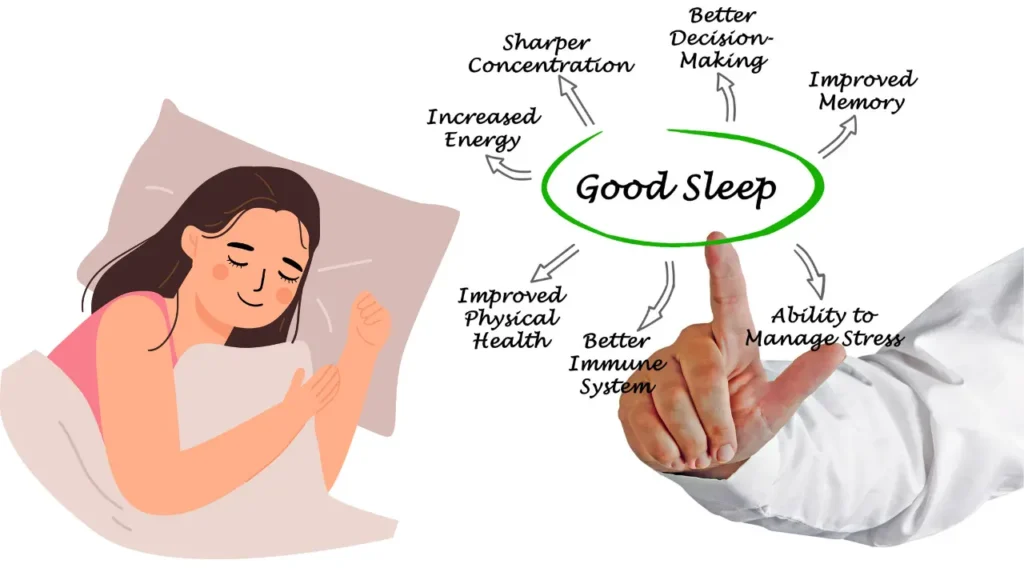In today’s competitive world, the importance of sleep in productivity often takes a backseat, as individuals juggle between work, family, and personal commitments. However, neglecting sleep can have a profound impact on one’s mental, physical, and emotional well-being. When it comes to maintaining peak performance in any field, prioritizing sleep is not a luxury—it is a necessity. Through this article, we will explore why sleep is crucial for enhancing productivity, how insufficient rest affects performance, and actionable steps to improve sleep quality for a more productive life.
The Crucial Role of Sleep in Boosting Productivity
Sleep is much more than rest for the body; it is a dynamic process that rejuvenates the mind, regulates emotions, and repairs physical wear and tear. The connection between the importance of sleep in productivity and overall efficiency is backed by scientific evidence. Without sufficient sleep, the ability to focus, think creatively, and solve problems diminishes significantly.

Why Sleep is Vital for Cognitive Function
- Memory Retention: During sleep, particularly in the REM phase, the brain processes and consolidates memories. This enhances learning and helps individuals retain critical information for better decision-making.
- Improved Problem-Solving: A well-rested mind has better cognitive flexibility, enabling it to approach challenges creatively and logically.
- Enhanced Attention: Lack of sleep impairs focus, resulting in slower response times and an increased likelihood of errors.
These factors illustrate that sleep is an indispensable tool for improving personal and professional performance.
Consequences of Ignoring Sleep for Productivity
Failing to recognize the importance of sleep in productivity can have immediate and long-term repercussions. While sacrificing rest may seem like a shortcut to achieving goals, it ultimately hampers overall efficiency and well-being.
Immediate Impacts of Sleep Deprivation
- Reduced Energy Levels: Persistent fatigue affects both mental and physical energy, limiting one’s ability to perform tasks effectively.
- Decreased Creativity: Problem-solving and brainstorming become challenging when the brain is not adequately rested.
- Impaired Decision-Making: Sleep-deprived individuals are more likely to make impulsive or flawed decisions due to reduced judgment.
Long-Term Risks
- Chronic Health Issues: Insufficient sleep is linked to conditions like obesity, diabetes, and cardiovascular disease, which can further impact productivity.
- Burnout: A lack of restorative sleep leads to emotional exhaustion and eventually burnout, reducing one’s capacity to work consistently.
- Cognitive Decline: Over time, sleep deprivation affects memory, concentration, and overall brain health.
These consequences highlight the urgent need to prioritize sleep as a fundamental aspect of productivity.
Benefits of Prioritizing Sleep for Maximum Output
When individuals acknowledge the importance of sleep in productivity, they unlock numerous benefits that elevate their performance in every aspect of life.
Enhanced Cognitive Abilities
- Faster Learning: Sleep improves the brain’s ability to absorb and process information, making it easier to pick up new skills or concepts.
- Sharper Focus: With proper rest, staying attentive and avoiding distractions becomes more manageable.
- Boosted Problem-Solving Skills: Well-rested individuals tackle challenges with greater clarity and creativity.
Improved Emotional Stability
Sleep plays a crucial role in regulating emotions, which directly impacts interpersonal relationships and stress management. People who sleep well are more likely to approach stressful situations calmly and collaborate effectively with others.
Increased Physical Stamina
Adequate sleep allows the body to restore energy, ensuring that physical tasks are performed with greater endurance and efficiency.
Debunking Myths About Sleep and Productivity
Despite growing awareness, several myths perpetuate harmful sleep habits. Addressing these misconceptions is essential for fostering a better understanding of the importance of sleep in productivity.

Myth 1: “Less Sleep Equals More Time to Work”
While it may seem logical to extend working hours by cutting back on sleep, the resulting fatigue and reduced focus make this approach counterproductive. Quality work requires a well-rested mind.
Myth 2: “Caffeine Can Replace Sleep”
Caffeine may provide a temporary energy boost, but it cannot substitute the restorative functions of sleep. Relying on stimulants often exacerbates fatigue in the long run.
Myth 3: “I Can Catch Up on Sleep Later”
Sleep lost during the week cannot be fully recovered over the weekend. Inconsistent sleep patterns disrupt the body’s natural rhythms, leading to chronic fatigue.
How to Improve Sleep for Better Productivity
Implementing strategies to enhance sleep quality is a practical step toward realizing the importance of sleep in productivity. Here are actionable tips to help you get started.
Create a Sleep Schedule
- Set Consistent Bedtimes: Go to bed and wake up at the same time daily, including weekends.
- Pre-Sleep Routine: Engage in relaxing activities like reading or meditation to signal your body that it’s time to sleep.
Optimize the Sleep Environment
- Dark, Quiet Rooms: Use blackout curtains and minimize noise to create a conducive sleeping space.
- Comfortable Bedding: Invest in high-quality mattresses and pillows for maximum comfort.
- Avoid Screens: Limit exposure to blue light from phones and computers before bedtime.
Practice Healthy Lifestyle Habits
- Regular Exercise: Physical activity promotes better sleep but should be avoided close to bedtime.
- Balanced Diet: Avoid heavy meals, alcohol, or caffeine in the evening.
- Stay Hydrated: Drink enough water throughout the day but reduce intake before sleeping.
Technology and Its Role in Sleep Management
Technology, when used wisely, can enhance sleep quality and, by extension, productivity.
Sleep Tracking Tools
Wearable devices and apps help monitor sleep patterns, offering insights into duration and quality. This data can guide changes to improve sleep. Find out best sleep tracker
Meditation and Relaxation Apps
Apps like Calm and Headspace provide guided sessions designed to reduce stress and facilitate restful sleep.
Smart Lighting Solutions
Smart bulbs that adjust lighting based on time can support the body’s natural sleep-wake cycle.
Why India Needs to Embrace the Importance of Sleep in Productivity
In India, the emphasis on achieving academic and professional excellence often overshadows the need for adequate rest. From students preparing for exams to professionals working long hours, sleep is frequently compromised.

Addressing the Issue
- Awareness Campaigns: Educating the public about the consequences of sleep deprivation and its impact on productivity is crucial.
- Workplace Reforms: Companies can promote sleep-friendly practices like flexible schedules and rest areas.
- Cultural Shift: Changing the perception that sleeplessness equates to hard work is essential for fostering a healthier mindset.
Also Read: The Pomodoro Technique: Unlock Incredible Productivity with This Simple Hack
Conclusion: Prioritizing Sleep for a Productive Life
The importance of sleep in productivity is undeniable. Sleep is not a barrier to success but a facilitator of excellence. By ensuring sufficient rest, individuals can enhance cognitive function, emotional stability, and physical energy, unlocking their full potential. Embrace the power of sleep, and experience the transformative impact it has on your personal and professional life.
